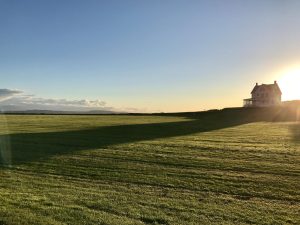Get the vaccine
It is up to us to stop spreading COVID-19
January 21, 2021

COVID-19 vaccines are currently being distributed in every state across the nation. Although the majority of people currently receiving the injection are healthcare and frontline workers, it will only be a few months before it will be available to a larger range of the population.
Once the vaccine is accessible to larger groups of people, everyone will need to consider whether they want to get it or not. Unless a demographic is specifically instructed by the CDC not to get a shot, it is your responsibility to do what is best to help lower the infection rate and stop the spread. And that means getting the vaccine.
Second-year theology major Claire Boswell knows that she will get inoculated as soon as she is able to. “I feel like it’s my responsibility to get it,” she explained.
As of Jan 19, the CDC has reported over 390,000 people have died from the coronavirus in the United States, and over 23 million cases. Millions of people have lost their jobs and our economy is in crisis.
“I don’t want there to be any more losses of life or other societal losses like kids not being in school, and economic losses,” Boswell continued, “It’s just time for this to be over, and I think getting a vaccine is the best way to do that.”
If ordinary people are able to help stop the spread and stop the deaths by receiving the injection, it is their duty to do so. We can not continue to sit around and just hope COVID will disappear. We must take action.
There are currently two coronavirus vaccines that are being widely distributed: the Pfizer/BioNTech vaccine and the Moderna vaccine.
Senior nursing major Kenzi Meyer, who works as a nursing technician at the University of Washington medical center, has received both doses of a Pfizer COVID-19 vaccine.
“I decided, even before they announced that the vaccine was coming out, that I wanted to get it,” Meyer said, “I decided I was willing to take whatever risks there were if it meant I was contributing to a community that could function somewhat normally again.”
Helena Balbirona, a third year nursing major, also received her first dose of the Pfizer vaccine in preparation for clinical training.
“I think that the current known side effects that people are experiencing and suffering from COVID are way worse to me than any potential unknown side effects of the vaccine,” she said.
When the immunization was first distributed, there was much to learn about how it may affect those who receive it. However, as more people have been inoculated, the Center for Disease Control has been able to collect far more data and has been able to make the process even safer.
On Jan. 6, the Center for Disease Control released a report stating that there is a chance of developing anaphylaxis after receiving the COVID-19 vaccine. However, the chance is incredibly low.
The report stated that out of the 1.8 million people who received the shot, 21 experienced an allergic reaction. Out of the 21, 15 of them had a reaction within the first 15 minutes of receiving their dosage.
Meyer has been working at the University of Washington to distribute doses of the vaccine. She explained that after receiving the shot, the hospital will have you stay for the next 15 minutes to make sure you have no adverse reactions. The CDC has also created an app that will send you text messages every day asking about your symptoms so that they can collect further specifics.
These systems have been put in place to make the process of receiving the injection as safe as possible.
As well as being concerned about possible side effects, many people have been worried that the product has not been properly tested, since it has barely been a year since research began. Yet, these fears are coming from people who do not understand the process of medical research.
“While it’s true that this has been a very quick process and usually it takes much longer to develop vaccines, the people who were working on it were working way harder than they ever have, and there was much more funding than there normally is,” Meyer explained, “Because this is something that people want to wipe out as soon as possible, so much funding was put towards developing the vaccine. As much as it seems like it was quick, they studied it very well, they studied it adequately.”
Neither Pfizer nor Moderna would have received a license to give out the injection if the product had not been properly tested. It has been tested and proven safe, and the side effects are still continuing to be studied.
Over the past year, millions of people have suffered. Not just those who tested positive for COVID-19, but their families, their businesses, their communities. This pandemic has destroyed America in more ways than can be counted. But now, we will have the chance to rebuild it.
Get the vaccine. Save our country.


























































































